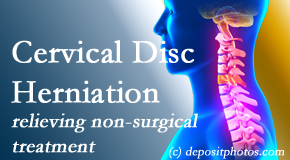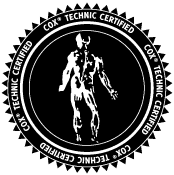Johnson Chiropractic Cares for Cervical Disc Herniations and Related Radiculopathy
Johnson Chiropractic cares for Richmond neck pain patients with cervical spine disc herniations that cause arm pain radiculopathy. Non-surgical care of arm pain radiculopathy eases Richmond neck pain and arm pain non-surgically.
CERVICAL RADICULOPATHY
In setting up a treatment plan for for cervical spine-related arm pain (aka cervical radiculopathy), research guidelines describe conservative management as a first-line treatment alternative over surgery. Clinically, cervical radiculopathy can present as motor change, paresthesia, reflex change, numbness and/or sensory change. Researchers have been working to establish guidelines for its non-surgical management and treatment at different stages of pain including acute, subacute, and chronic. (1) Johnson Chiropractic uses such guidelines in planning non-surgical treatment for our Richmond chiropractic patients.
GUIDELINES FOR TREATING CERVICAL DISC HERNIATIONS
In reporting the non-surgical guidelines, researchers described the risk-benefit ratio for surgical treatment of cervical radiculopathy as less favorable than for non-surgical, conservative care. In looking at care of cervical radiculopathy through its phases, the non-surgical interventions’ guidelines move from acute/more passive care to more active, individualized, self-managed care in the chronic phase. Specifically, for the acute stage, multimodal management involving spinal manipulation, patient education, exercise, and positioning that eases the pain were valuable. For subacute cervical radiculopathy, enhanced specific exercises, supervised motor control motions and/or mobilization may be incorporated. For chronic pain, general aerobic exercise and strength training, postural instruction, and ergonomic assessment of job-related activities may be incorporated}29}. (2) We find that our neck and arm pain patients appreciate activities like this that allow them to return to living.
TIME AND THE CERVICAL DISC HERNIATION
Overall, in a recent systematic review study, 56.4% of degenerative cervical radiculopathy patients - 39.1% of conservatively treated patients and 60.5% of surgically treated patients – reported motor deficits before treatment. (3) A spine surgeon presented a case report of a patient who was ready to undergo cervical spine discectomy/fusion surgery for a C4-C5 disc herniation whose disc resorbed on a confirming repeat MRI, rendering surgery unnecessary. The researcher acknowledged that more research was accessible on lumbar disc herniations’ decreasing as seen on MRI by 34.7% to 95% over 6 to 17 months and total resolution of the disc in 43% to 75% yet postulated that cervical disc herniations were likely to act the same way. (4) Like the author, Johnson Chiropractic holds out hope for our cervical disc herniation and cervical radiculopathy patients that surgery may not be required. Our conservative Richmond chiropractic treatment will quite possibly help healing.
CONTACT Johnson Chiropractic
Listen to this PODCAST with Dr. Umar Ellahie on The Back Doctors Podcast with Dr. Michael Johnson as he illustrates cervical radiculopathy and its relieving care with The Cox® Technic System of Spinal Pain Management.
Make your Richmond chiropractic appointment today. Cervical radiculopathy and cervical disc herniation sufferers have a pain-relieving partner at our office.


